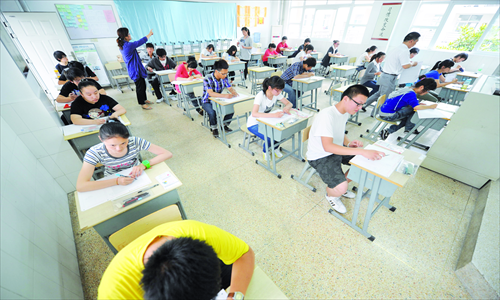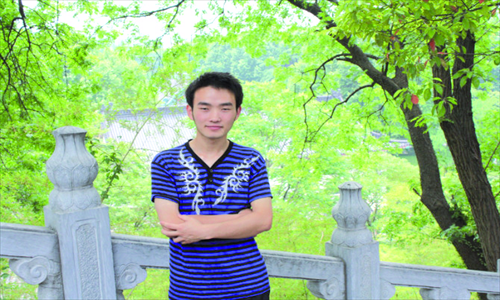From protest to advocacy

Xu Mengnan detested the idea of taking exams and going to college. He deliberately failed his college entrance exam back in 2008 in protest of China's education system, which he felt was deeply flawed. But now the repentant 23-year-old is urging students to play by the rules.
"If you want to change the system, you have to be in it, understand it and adapt to it first," said Xu, who now works at a pig hair processing factory in Jiangsu Province.
During last year's national college entrance examinations, or gaokao, Xu made flyers and posters warning students not to repeat his mistakes. He says he still believes the education system needs reform, but failing the exam is not the way to address this.
Seeds of discontent
Nobody in Xu's family has gone to college. In Shanghai, his father works at a construction site and his mother works at a garment factory.
From a rural area in Bozhou, Anhui Province, Xu is the second of four children and the oldest boy. He was the only one in his family who had a shot at college. His brothers, both teenagers, have only finished middle school.
Xu was in the top 10 percent of students during his first year in high school. As a sophomore, Xu read some books by Han Han, a post-1980s popular writer, blogger and car racer, that were critical of China's education system. Han dropped out of high school at 18 to become a race car driver and writer.
In these books, Han called the Chinese education system a failure, criticizing teachers, schools, mathematics class, enrollment and students.
Han's writings resonated with Xu, who at that point had never thought about why he was studying and taking exams. "We knew nothing except studying for the gaokao," said Xu.
After this change of heart, Xu silently rebelled against his education and focused most of his energy on reading books and writing about how the education system should be reformed. Xu wrote articles and books urging institutions to take into account a student's interests and talents rather than test scores alone. He wrote to education authorities and Han. Nothing happened.
Xu figured public attention was what he needed to be taken seriously.

Nationwide rumblings
Xu wasn't the first to express frustration with the system by deliberately failing the gaokao. In fact he got the idea after reading a report about how Jiang Duoduo, a student from Henan Province, wrote 8,000 words denouncing the education system all over her gaokao exam materials in 2006.
"I thought this is the way to do it, to get the attention I need, just like Han Han," said Xu.
Xu didn't tell his parents about his plans because he didn't think they would be able to understand, and he believed they would try to stop him.
After scoring 143 out of 750, he got the media attention he wanted. But the attention was unflattering and fleeting. Not many people were appreciative of what the then 19-year-old had done.
Xu's teacher told Anhui-based Xin'an Evening News that Xu was "sleeping in class a lot" and spent too much time on the Internet playing online games. The teacher found the idea of changing the education system through such irrational behavior laughable.
Xu Guangfeng, his father, said to the newspaper that he believed his son was committing a crime by trying to fight against the education system and burned many of his son's writings.
Having been so confident that the stunt would work, Xu couldn't believe how it all went down. "It was all very hard to digest. It was like I was still in a dream, not awake yet," Xu recalled. His enraged father arranged for Xu to work in Shanghai and Xu silently went along with it.
Since 2006, each year there have been a couple of students who deliberately failed the gaokao to make a point. Some of them hoped that their talent would shine under the spotlight and be recognized.
In 1929, Qian Zhongshu scored high marks in English and Chinese but got only 15 points in mathematics. He was accepted by Tsinghua University and went on to become a renowned writer and scholar.
In 1973, Zhang Tiesheng failed to answer most questions during the gaokao and became the first anti-gaokao rebel. He immediately rose to fame and was admitted to college. Later he went into business and has since become a millionaire.
Ji Jian, 25, from Zhenxiong, Yunnan Province, deliberately failed his gaokao in 2008. He had hoped that his talent in math would get him into a good university, like Qian. But nothing came out of all the media attention.
Change of heart
Xu wrote his story and the stories of others like him online. He set up a website this year, where he collects stories about students who score zero on the gaokao and news reports on education, as well as contributes his own writings on the topic.
Working at a factory owned by his in-laws, Xu earns about 3,000 yuan per month and doesn't have to pay rent. He works in the morning and spends most of his afternoons browsing the Internet, reading and maintaining his website.
Xu has never felt the urge to go back to school more strongly than he does now. Before the gaokao took place this June, he had recurring dreams about going back to high school and taking the exam again.
Xu said he didn't have any dreams or goals when he was in school. "My teachers and parents were always telling me to study hard and go to a good college, find a good job, and have a good life," said Xu. "But I never knew what that meant, nor did I ask."
Studying hard in order to go to a "good college" and have a "good job" becomes most students' only goal in life. Like many others, Xu did not stop along the way to contemplate what he wanted to do when he grew up. "Sure I daydreamed about becoming a policeman, or a teacher, but those were fleeting thoughts and I never had any serious goals, nor did I have any particular talents or interests," he said.
None of the students who made headlines for throwing the gaokao have made it to college. Some regret their rebellious move, some stick to their earlier convictions. Jiang is now studying at a vocational school in Shanghai. Ji works at a factory in Zhejiang and continues to write articles criticizing China's education system.
Looking back, Xu said he was too immature. Xu and his wife are expecting a baby in January next year. He said he would like his child to take the beaten path of textbooks and exams. "I want my kid to play by the rules."